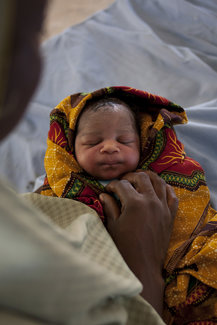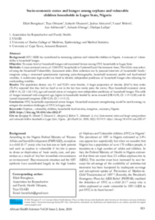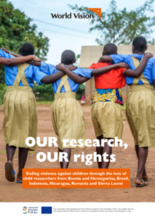

Displaying 101 - 110 of 634
This video series from UNICEF shares the stories of young girls living through COVID-19 – coping with the fears of child marriage, the struggles of distance learning, and the burden of isolation.
The purpose of this study from the journal of African Health Sciences was to assess the level of household hunger and associated factors among orphans and vulnerable children (OVC) households in Lagos State, Nigeria.
This article from Modern Ghana calls attention to child protection concerns in Ghana amidst the Coronavirus crisis in the country.
This policy brief from Save the Children outlines the ways in which the COVID-19 pandemic has impacted children's education in West and Central Africa and offers recommendations for reinforcing the efforts made by government to reach the most vulnerable.
The goal of this paper was to conduct a review of studies from 2008 to 2019 that evaluated community‐based caregiver or family interventions to support the mental health of orphans and vulnerable children (OVC) in sub‐Saharan Africa, across four domains: (a) study methodology, (b) cultural adaptation and community participation, (c) intervention strategies, and (d) effects on child mental health.
In the present paper, the Ecological Systems Theory is used to depict different vulnerabilities associated with orphanhood in the Ghanaian context.
"The lockdown measures have increased the risk of children [in Nigeria] becoming victims of domestic violence, bullying and other forms of abuse," says Rev Ifeanyi Mbaegbu in this article.
This child-led research initiative was conducted under the umbrella of World Vision’s DEAR project (Development Education and Awareness Raising) and the Sustainable Development Agenda 2030. The study explores explore SDG 16.2, the goal that focuses on the issue of ‘abuse, exploitation, trafficking, and all forms of violence against and torture of children’.
With a recent interest by stakeholders in Ghana to consider kinship care as an alternative care option in child welfare policy, this study explores current kinship care challenges to help identify and address potential setbacks for policy and practice recommendations.
This article from BBC News describes the movement of children and young people in Nigeria from Koranic schools back to their homes during the COVID-19 crisis, "one of the biggest ever state organised mass movements of minors in Africa's most-populous state."



